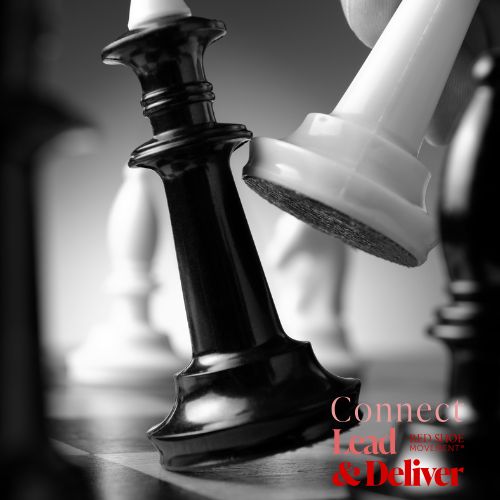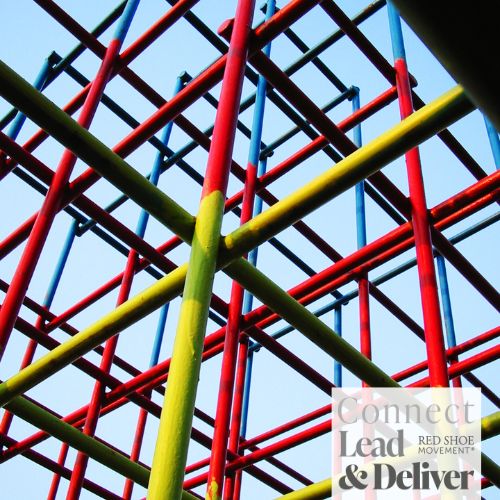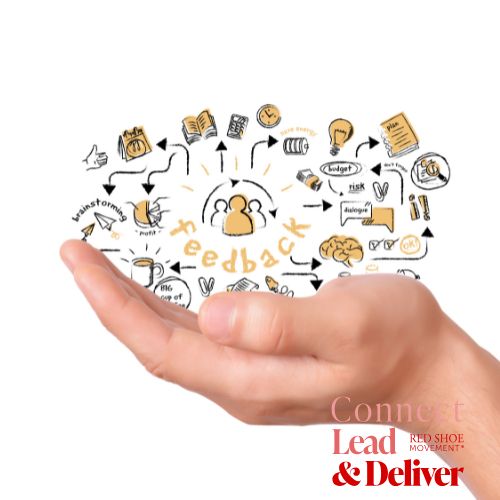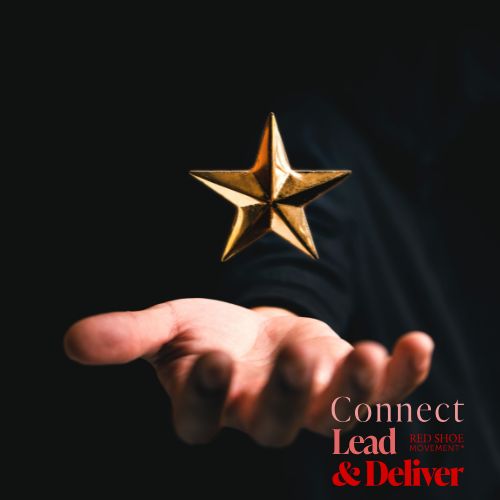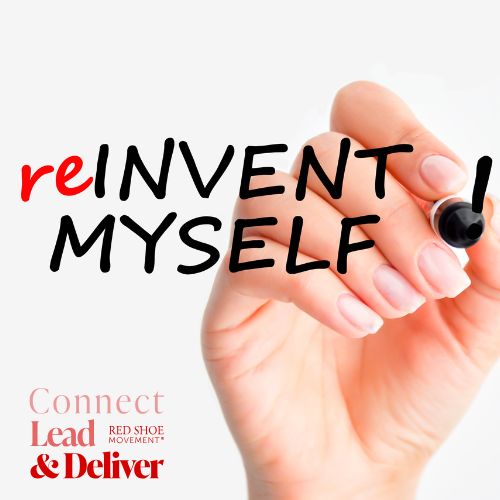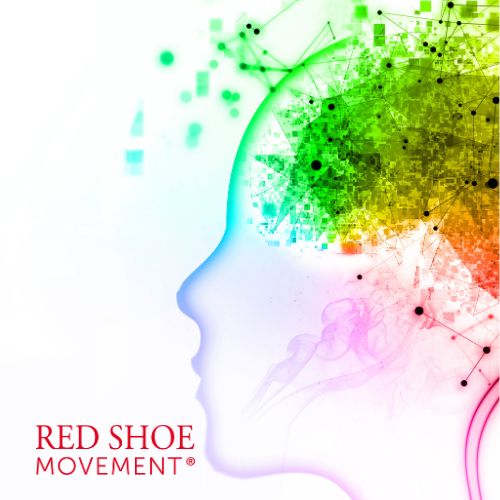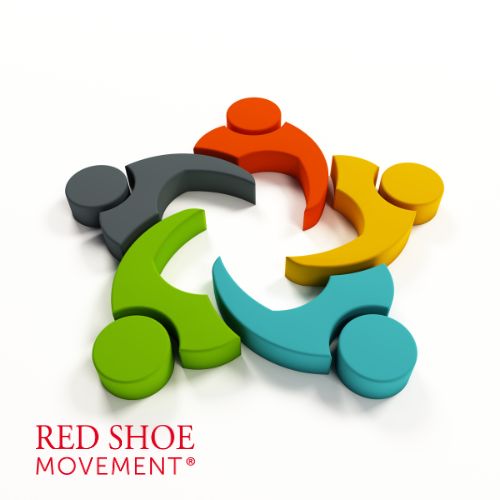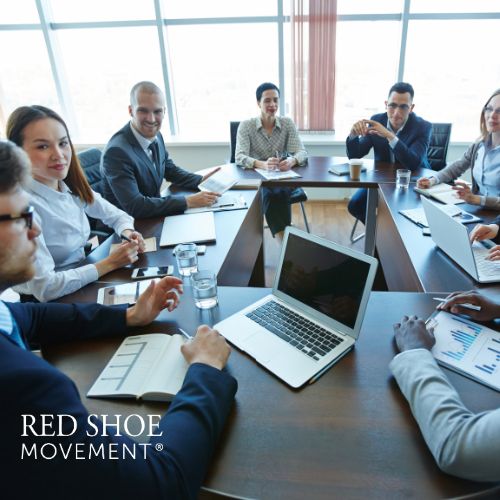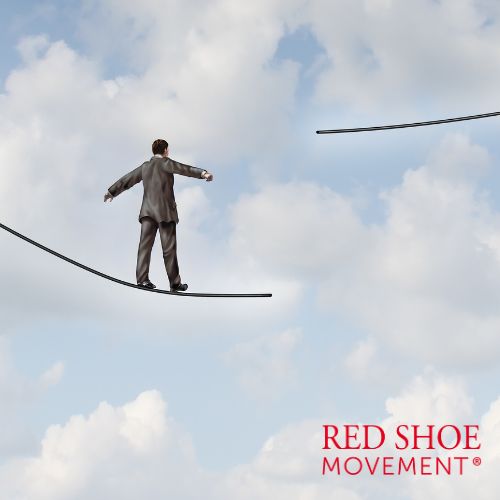Aric Dromi is a keynote speaker, futurologist, digital philosopher and self-proclaimed professional troublemaker who helps people and organizations design the future they wish to live in.
He has one simple mission: inspiring a change in the way the world and the technologies that govern it are viewed and experienced. To question the status quo and stimulate the kind of critical thinking that’ll shift priorities and better equip us against challenges ahead. Challenges we’re not prepared for.
Aric is passionate about the transformation necessary at political, societal and personal levels in preparation of a rapidly evolving future and the technologies taking over it. He is CEO and founder of TEMPUS.MOTU and creator of Dead Rabbit Society – both dedicated to coming up with ways to make the world and its leaders take notice of a fast-moving digital era we are already a part of.
Here’s what the story-maker had to tell Red Shoe Movement about experiencing technology, the importance of critical thinking and creativity, and navigating our way through a new technological revolution that’ll be like nothing humankind has experienced before.
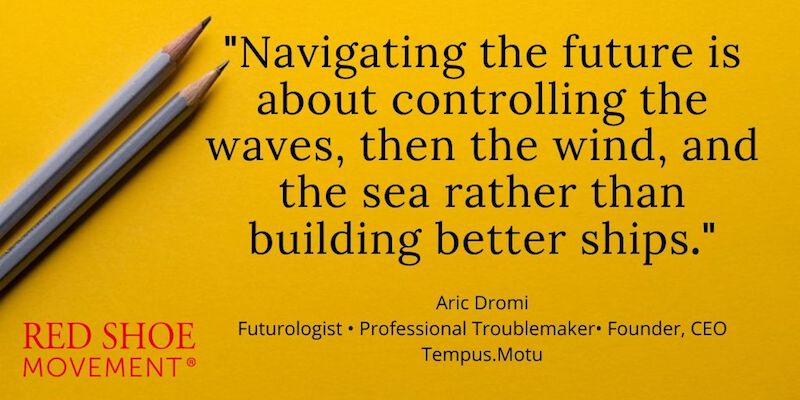
How to design the future
Aline Cerdán— Can you explain a little more about your role as a futurologist and what it entails? What are some of the elements you consider when navigating the future?
Aric Dromi— always take the simple approach answering the question of what a futurologist is. I tell stories about potential futures that could happen and reverse engineer these potentials into concepts and trajectories of futures that should happen. In this context, you can’t merely be reactive but rather build proactive frameworks that can design future trends. If you do that, you control the narratives of the future. Navigating the future is about controlling the waves, then the wind, and the sea rather than building better ships.
AC—How will things like work, life, and travel change? Is there a way to prepare for a digital age?
AD—We live in a world where technology is augmenting almost every aspect of our lives and enabling us to enhance our virtual presence using code. Empathy, freedom, wellbeing, intelligence, education, governance, creativity, economics, and politics are the primary benefactors of the exponential growth and impact of technology.
For the first time in the history of humankind, natural evolution has reached the zenith of its potential. There is no place to go from a biological point of view. Yes, we might become a little faster and jump a bit higher, but we have reached a point where our organic structure cannot evolve anymore. Even with genetic modifications – sooner or later – we will hit the limit of our evolutionary potential.
We live in a world where technology is observing us more than we are observing it, and it is reality, the information doesn’t exist behind the screen anymore – we are the information. Every aspect of our existence is being quantified, stored, and monetized. This has already fundamentally changed (even if not on the societal level) the narratives of work, travel, mobility, and more. The App economy improves the way we book a hotel, order taxi, pay for services, work remotely etc.
I don’t think we should put any effort into preparing for a digital age, as we are already living in one. My main concern is that we keep driving our economic models based on buzz words that force our resources to focus on technology rather on the development of humankind, individuals and strategic thinking.
When we keep building “smart” things (smart phones, smart cities, smart cars) the word smart means Technology. We keep surrounding ourselves with technology and forgetting that our entire infrastructure, that may be cities, legal, educational, political and economic models can be traced all the way back to the Roman Empire. Moving forward, we need to rethink the fundamental building blocks of societal development and evolution or we are simply building a house of cards.
Sergio Kaufman of Accenture shares how technology levels the playing field for women

AC—How are algorithms affecting us as human beings? How can we rethink the way we experience technology?
AD—What is an algorithm? It’s math and code coming together creating a set of routines that are designed to solve a problem (OK, I’m over simplifying). How many people actually understand what an algorithm is? Yet we are surrounded, directed, and even manipulated, by algorithms every day. From phone notifications, to content recommendations, digital communication, food consumption, online shopping, and social interactions, algorithms are the invisible puppet masters that frame our existence in the modern age. I’m not trying to be negative, but rather emphasize the need to better research and understand the side effects (that are fast becoming the new norm) of living in a world where the control strings are written in code.
AC— What is The Dead Rabbit’s Society? What is it about discomfort that helps challenge the status quo and better design the future?
AD— The Dead Rabbit Society was born out of few lectures I did with students outside the normal academic framework. I saw a need to rethink the narratives of education and the objectivity of the important questions we need to ask ourselves to secure our desired future. In a world of sanitized, politicized and agenda-filled news broadcasts, finding the truth has become a full-time job. We are confronted by a cacophony of trite media stories that have little or nothing to do with our reality in the present or, more importantly, the future. Yet for all the noise there is no clarity, no critical thinking, no objective voices to defend our society from an imminent future for which we are more than ill-prepared.
The Dead Rabbit Society’s role in all of this is to highlight the major questions of our time and to get people thinking about potential solutions the will carry us forward toward our desired future.
We do this via our online community, through hosting events, conferences and keynotes and we are embarking on an ambitious plan to produce documentaries around these questions. The first documentary will examine The Future of Work in a world that will be increasingly run by artificial intelligence and automated production capacity.

People don’t seem to have fully grasped the implications of AI and automation. Our society is on the verge of seismic changes, the likes of which we have not seen since the Industrial Revolution. This revolution will also displace a lot of employees and professions. But it won’t just be truck drivers and taxi drivers that are affected. Lawyers, doctors, surgeons – all manner of professions will be threatened by this technological revolution. But you don’t hear people talking about this. Our goal is to change that. We would like to highlight the issues, the questions, and have people put pressure on their political representatives to come up with a direction, a strategy for a future where we may not be employed as we currently know it. We can either sit back and hope that someone puts the genie back in the bottle, or we can be proactive and try to shape the narrative so that the future we encounter is one of our own making and not the result of a string of poorly made decisions based on incomplete facts that exclude the most important component of our future – people.
What we have seen so far is that most people are blissfully ignorant of the coming changes and have blind faith that things will work out for the best. Guess what – they won’t. Without clear and agreed direction we will be at the mercy of despots, corporations the size of continents and we will be slaves to our own data footprint. We have a choice. The Dead Rabbit Society’s aim is to highlight the choices and instigate an informed discussion.
Companies design the future by thinking differently
AC—How can companies instill a culture of creativity and risk-taking?
AD— I think the keyword here is “culture”. Companies must remember that we are born into culture, we are not born with culture. It is something we learn through the interaction set by our environment. To instill a culture of creativity and risk-taking you must have an assertive leadership team’s commitment to set the example.
Focusing on increasing your core earning model – and forgetting how to nurture and defend it – will never give you the tools and know-how to expand the foundation of your business.
So, this is the end destroying the means. If you focus on how profitable your business is today, your organization will not be productive tomorrow. Engaging in iterative change ensures you follow the pack as opposed to reap the rewards of being a thought-leader. Fear is the spawn of ignorance. If you only consider what has happened – or worse, what is happening – you can’t help us with tomorrow. Learn from the past, be present in the moment and let that insight allow you to think differently about the future.

Traits we need to prepare for what’s coming
AC—What can we do to educate ourselves on connectivity and the way we experience technology? What traits and abilities will we need moving forward to design the future we want to live in?
AD—I would start by asking the question, what does it mean to be human in a world where technology determines almost every aspect of our existence? I think we have already passed the point of no return where we can “live” without technology and as such we should find way to partner with it to define the next steps of human evolution. We need better-educated leaders and politicians. We need a better understanding of policymaking.
We can easily list the skills that today’s children will need to successfully navigate the future:
- Critical thinking
- Analytical thinking
- Creativity
- Originally
- The ability to solve complex problems
- Emotion and passion
But why is that list different from the skills we have always needed to excel in life and rise to the apex of our own potential? The truth is it’s not!
We do, however, need a set of new ideas for these skills:
- We can’t use code the same way we use bricks
- We need to move from managing-for-profit, to managing-for-impact
- Experience should be measured by the quality of choices and not by the number of its functions
- Don’t confuse symptoms with the appearance and root cause
- Assets need to build up into properties and capital to deliver value to society
- Think of technology as a legal system. The legal system was designed to be used (and sometimes abused) by lawyers – entrepreneurs use technology – technology is never the end goal, but simply a path.
We shouldn’t focus on experiencing technology but how technology can enable us to better experience ourselves and life. Think of technology as fire. Mankind learned how to tame fire (for the most part) – but we have already lost control of technology. This needs to change – quickly.

AC—How can concepts like morality and trust be redefined? Who will determine what the code of conduct in the digital age should be?
AD— I often ask people in my keynotes: If I visit a brothel run by robots and have sex with a robot, did I cheat on my wife? Can she rightfully sue me for divorce? What if someone hacked my artificial intelligence digital assistant and deleted the code. Can I sue that person for murder? I don’t have one simple answer around the future of morality, ethics and trust but rather a suggestion. We need to understand that our current system will never scale into a future that is anchored in code. We need to start telling stories about potential futures and stress-test them in front of policymakers to better help them rethink the process narratives that they use to design their policies. We can do this in a number of ways:
- Identifying the unknowns in domains critical to the stability and development of humankind’s current societal structure
- Defining the questions around which leaders and politicians can design a desired vision of the future
- Developing strategies to realize this future by implementing the necessary tools and processes to deliver on the desired vision
- Designing a set of experiments and scenarios in various domains to better prepare local, national and global leadership to tackle the upcoming challenges.
This is how we work with policymakers and governments, high business leaders and NGOs with our Think– Do–Rethink Tank, www.tempusmotu.org
Only by bringing the best minds together and providing space for them to develop these potential future narratives can we stress-test them and improve them through an iterative process. This is something that I am extremely passionate about.
In the end it is about defining the world you wish to live in, modelling it, testing it and improving it. If we continue to use the past as the gateway to the future we will not move very far. This is challenge I put to every leader I speak to. We can make the world a better place, if we want to.




